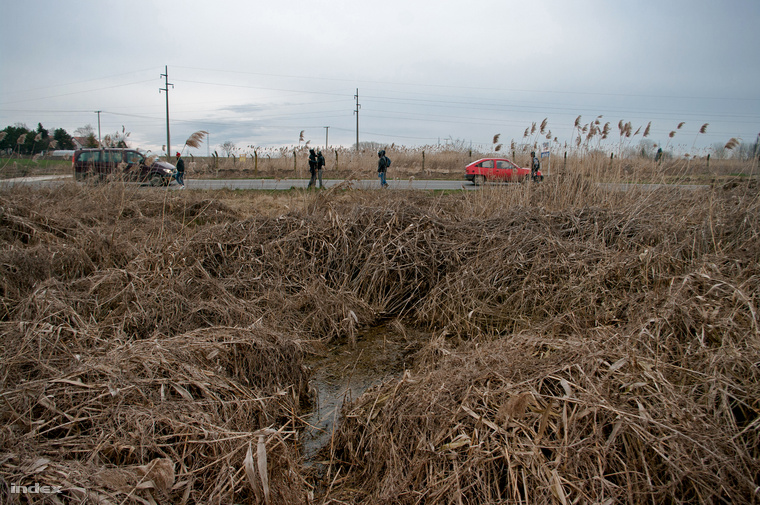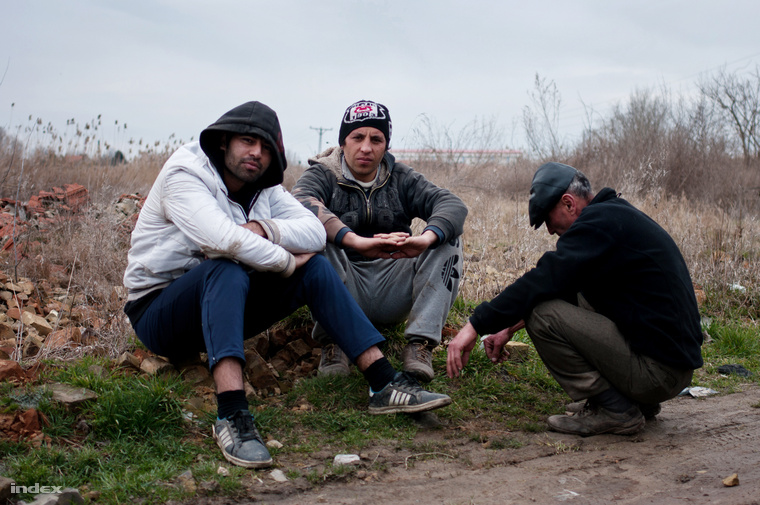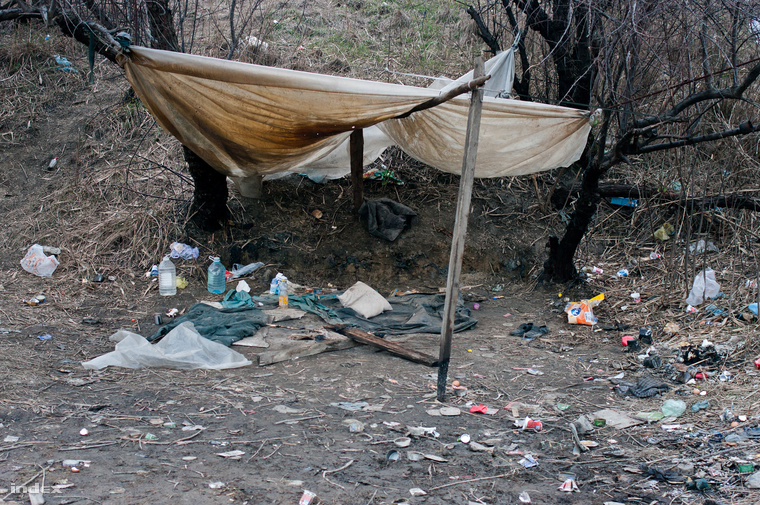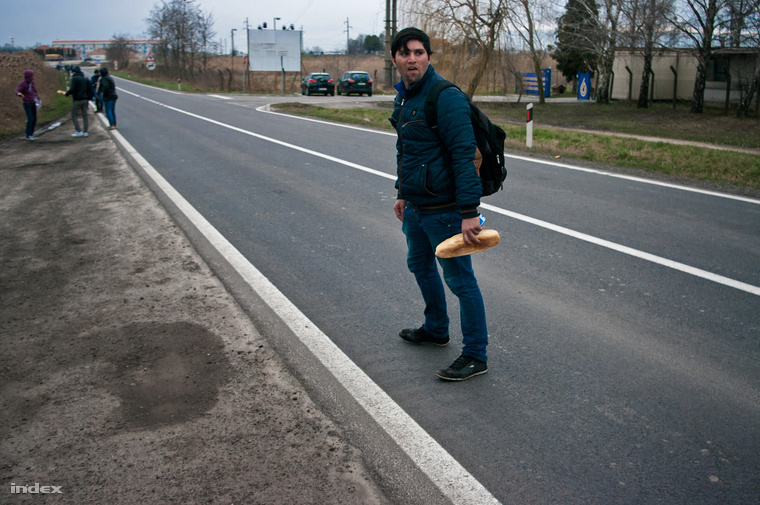I fled to Hungary through the green border in my underwear

- Hungary is the main entry point of the migrants on the Balkan route towards the EU.
- Most of the migrants sneak thorugh the Hungarian-Serbian border
- A Hungarian journalist joins a group of Afghani migrants, and crosses the green border
It is true that I had never crossed any border illegally, but I had not imagined the action would start with irresolute running about in the dark. But of course, coming to think of it, the hesitation was not without reason.
I had spent only half a day among the migrants hiding on the Serbian-Hungarian border, but I had made certain that these people only knew two things for sure: where they came from (in my case from Afghanistan, Iraq, Pakistan) and where they were going (Germany, France, Sweden, Italy). The route between the two, however, they were less certain about.
Read our other story on the migration crisis
Lampedusa once was known as an idyllic holiday destination on the Mediterranean sea. But the island become the synonym of misery, mass death, blindness, and egoism, as the boats of migrants has arrived. Read what we have experienced on the remote Italian island.
The migrants who has just stepped on the shore of Lampedusa told us how they travelled through Africa, until they reach Italy.The stories rather reminded us on the movie Mad Max.This happend later, when hundreds of migrants appeared on the main Hungarian railway station. They couldn't travel further, so they camp in the middle of the city for weeks.
When a couple of hours earlier, sitting by the bonfire, I mentioned I was Hungarian, the word Hungary or Majaristan ringed a bell for only a part of the company, though the border ran less than 30 kilometres away. It was obvious that the stations between the starting point and the destination had only momentary importance. What does a person fleeing from Afghanistan care about the expanse of the Iranian stone desert, if winter is hard in Anatolia, what the capital of Bulgaria is called, or which country Serbia shares borders with? The whole thing is important exactly as long as they are staying in the given area.
This fact would be enough to cool down Antal Rogán, the man conducting the hate campaign against migrants, since Hungary bears about the same significance for them as Pakistan or Bulgaria. We are a forgettable point on the road, not the destination.

The unawareness of the migrants caused all the more trouble to me, when we finally set off: I wondered if we were to ramble in the wilderness for all night and find ourselves somewhere in the depth of Serbia at dawn, having accidentally taken the wrong direction.
We play army
Having no guide, we stumbled in the little wood dodging one another. We could be some hundred metres away from the camp site. I thought, for this result it had been unnecessary to spend a long time making plans over the smartphone of the Afghan brothers to set the course on Google Maps.
I, in fact, also saw as much on that map that we should cross the nearby causeway. But instead, our group was clomping in the pitch-black night parallel to the road. Then, at an unmarked point, one of the men in a hoodie beckoned: now, come on, let us cross the road! The group formed a file and broke into a run in the dark.
I plopped down behind the bank on the other side, beside panting Afghan and Iraqi men, and I felt like when we had played army as boys. It used to be fun running around and hiding like that, but back then we could as well have stood up and walked home to have dinner.
We were thirteen in the groove, ten Afghan people, two Iraqi men and one Hungarian. The others, it followed, had stayed in the camp and would try to get across at another time. I did not have much time to think since as soon as all of us had arrived, the march continued. A short Afghan man, who pulled his cap over his eyes, grinningly beckoned to me to go, offering to stay at the end of the file.
I had to hurry up; we marched in a pace as if we were hurrying to catch the train that is just arriving, with the only difference that we were going towards a pond. The water was still and black, as though it had sucked in itself all the darkness out of the night. In the middle glowed the embankment that bridged over to the other side, where the dead-white lights of a farm-house gleamed. Even if someone lived there, they had long been watching TV or fallen asleep. Yet, we ran along the embankment hunched up, and threw ourselves into the reed again.
I felt increasingly sillier and would not have been surprised if the migrants around me had suddenly stood up laughing, saying “Ha-ha, mate, you believed that we would crawl all the way to the border?”, patting me on the shoulder and getting going on the cart-road by the reed.
But it did not happen that way. We set off in a forced march parallel to the road, on the freshly tilled land.
The empty road marked in the mist by the pale globes of street light ran beside us, yet we rather kept falling and getting back up.
The Darwinism of migration
I saw one positive development: a hierarchy had formed. The hooded Iraqi man led us at the front, and the short Afghan man with the cap closed the march. I was jogging in the last third of the line, behind the Afghan brothers. They had the smartphone with the Google Maps.
We assembled again in the dry shrubs by a four-lane road. “We are getting across in pairs” – the whispered agenda of the hooded Iraqi guy was translated to me. It was then that it started to dawn on me that maybe we were not wandering mindlessly.

The capped Afghan man crawled ahead to a point from where he saw the surrounding area and whistled when the cars disappeared in both directions. Then the couple whose turn it was had to sprint across the road.
I waited long before I could go. The wheels of the cars roared at eye-level, I could almost see the passengers behind the windscreens swishing past. I could as well have been one of them, one that turns on some music, talks placidly, or turns up the heating, unaware of the fact that out there a group of people, whom fate has swept 6000 kilometres away from their homes, are looking at him with wide eyes.
Then the whistle came, we ran across and hid in a hollow waiting for the others to join us. The company no longer moved like a lost group of drunk scouts but as if they were taking part together in some drill. And so it was, despite that these people had met for the first time two days before at the meeting point outside Subotica.
That is because only those reach this point who have undergone the 6000-kilometer-long drill, those who have accomplished the test of jogging in the desert of Iran, the unauthorised crossing of the Turkish border, the Bulgarian prison, and the escape from Serbia. An alarming picture took shape before my eyes:
I get lost
I tried to brush away the disquieting thought with conversation. I showed the people lying near me that there was no need to worry even if we got lost, I had an excellent mountaineering headlamp with me. But the high-tech gadget did not inspire awe. They looked at me as though I had suggested displaying spectacular fireworks. “Don't think of turning it on!” – they whispered forcefully. “There can't be any light, we mustn't even smoke.”
It was then that I began to suspect that we were not erring randomly in the dark, parallel to roads. We moved only in the dark in order to avoid every place where we could be seen. In the very beginning, our start had been slowed by the need to find an unlit section on the causeway. We had chosen to clomp in the prickly weed for half an hour rather than appearing for a minute at a place where we would be clearly visible.
With the night in progress, though, this tactic increased the hardships. Pacing on the sludgy ground our steps began to squelch; mud, and later water appeared in the hollows, and in the end we were lumbering on a wetland expanding to the limits of eyesight. I tried to step from bump to bump, sometimes I got to a dead end, then I turned back to get ahead with dry feet in another direction. Then I raised my eyes and found myself standing alone in the slimy darkness.
I did not hear voices either, so I made a haphazard choice of direction. I no longer watched my step, I slipped into puddles and at last broke into an alarmed jog, the icy water splashing around my ankles.
From the corner of my eye I saw something move. It was the hooded Iraqi guy, who beckoned, then turned round and ran away. I did not think about how strange it was of him to have come back for me. Or why I panicked as if the first break of light finding me on an open field had meant imprisonment for me too.
The darkness and marching for hours on end merged the different aspects of reality. I could no more detach myself from the situation that I was only observing what this unauthorised crossing of the border was like. There was no logic to it, but we felt that we had to march and must not abandon each other.
Would this be Hungary?
Ditches filled with cold water crossed our path. I managed to leap over the first one, while the people splashed into it one after the other. The second time my jump was too short, I sank into the water up to my ankles. At the third ditch I fell off the slope, landing on my bottom, the icy water ran up to the middle of my back.
Nobody laughed or grimaced, there was not even any cursing when someone fell over in a pit; as though this was the regular way of traffic. We seldom stopped in the shelter of a bush to check the direction on the only smartphone of the company.

Around one o'clock after midnight we got to a place with sandy hills and groves. We proceeded in single file in the bristly undergrowth.
The outlines merged in the darkness, I could only guess that we were probably moving in a beautiful landscape, but reality confined itself to the narrow bounds marked out by the branches hitting me in the face and the back of the man walking in front of me.
I was distracted from this strange mental condition only once: we climbed over a game fence, and the people flopped down beside me one after the other. The TV announcer from Kabul known from the previous article clambered onto his feet right before me and asked in a hopeful voice: “Is this Hungary already?” I could not help laughing. I disappointed him, we had to go on for hours.
This is what the green border looks like
The border was a wide channel running across a grove. The group got animated when the blue spot marking our position slipped over the red target point on Google Maps. But instead of attacking the water we looked for a passage over it. We were exhausted, we had been marching for six hours and nobody could draw himself to wade into the channel with late winter inland water.
We proceeded on the bank for a long time until our leader found a thin tree fallen across it. We balanced through the natural bridge one by one. The more adept fell into the water at the very end of it, the moderately able in the middle, where the water flapped up to their chest, and the clumsy right at the start, so they got wet only up to their knees.
I tried a tack: I fell behind to the end of the row in order to be able to tug off my trousers and socks, and I inched along astride the wood.
I arrived at the opposite bank proudly, yet I was not received by appreciative looks but nobody at all. I ran up the slope, but the empty field looked back at me. I had another attack of separation anxiety. I sprinted to the clearing. My feet were clapping on the cold ground. I did not find it peculiar to run in the cold night at three in the morning with only my drawers on in order not to be caught by the border patrol. I had no reason to be afraid of them anyway, since I had a passport and citizenship too. If someone had said that 24 hours earlier I had been riding my bike on the way home from the Fekete Kutya gastropub, where I had spent an excellent evening, I had listened to King Krule, and had stopped at a non-stop shop to buy a Túró Rudi, I would have laughed at them.
I caught up with the group at the fringe of the wood: they were sitting there giggling and patting each other on the back. They kept saying “Hungary, Hungary”. Their enthusiasm was unfounded, since that was the riskiest part of the trip. But then we had been marching for seven hours, their discipline loosened, and happiness was surging in them like light intoxication over the fact that what they had been suffering for for months had happened at last:
they arrived in the European Union.
Apartheid Hungary
Next we were clamping on the empty main road towards Ásotthalom, and everybody wanted to talk to me. How, did I think, they could get to Italy? And to Germany? Some people had relatives in Sweden. Everyone wanted to get to a relative, an acquaintance, or someone from their village. Nobody seemed to go to the complete unknown.
Of course, I could not help. “When I travel, I take my passport and get into the car or buy a plane ticket. I know of no other way.”

The chattering was interrupted only once. Someone shouted “police”, and the group shot out in every direction. I jumped into the duff too, and lying down I saw the beam of light colouring the foliage. A police car glided before us with nerve-racking slowness. I had read about that the police prepared the villagers as well, teaching them how to raise the alarm when they see a stranger.
Some minutes later, however, we moved again as if nothing had happened. In fact, something was, indeed, happening slowly. More and more people fell behind, the group spread around, and I entered the village with three guys altogether. I said: “I'll find a bus, one can get to Szeged from here”. “We are going this way” – said they, pointing to a desolate bystreet. I was left alone.
“No, no” – the driver of the coach pushed his hand in my face with the expression of an assertive citizen of the South African Apartheid announcing:
this is a negro-free bus.
I looked exactly like a refugee: shabby, unshaven, my clothes were muddy, and my cap full of thistles, but I had a means to evade everyday racism. I spoke Hungarian.
“To Szeged, please.” – I said, and took my wallet.
The driver picked the ticket between two fingers. “You aren't local, brother, I can see that.” – He grimaced.
Well, there are some of us in the same shoes in the world.
– I answered, and walked inside between the seats. The passengers looked down with embarrassment.
Read the first part of this series
Our journalist joins a group of migrants in Serbia, and got captured by the Serbian police.

Support the independent media!
The English section of Index is financed from donations.


